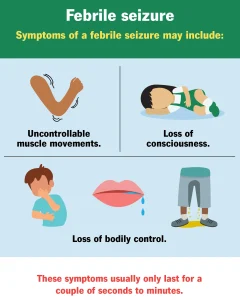Overview
Diagnosis
Febrile seizures usually occur in children with normal development. To diagnose the condition, your doctor will review your child’s medical and developmental history to rule out other risk factors for epilepsy. In most healthy children, the first step after a febrile seizure is to identify the cause of the fever.
Simple febrile seizures
Children who are up to date on their vaccinations and experience a first simple febrile seizure typically do not need additional tests. In these cases, the diagnosis can often be made based on the child’s medical history and symptoms.
For children with delayed vaccinations or weakened immune systems, your doctor may recommend certain tests to check for serious infections such as:
-
Blood test
-
Urine test
-
Spinal tap (lumbar puncture) to check for central nervous system infections such as meningitis
Complex febrile seizures
If the seizure is complex, your doctor may recommend additional evaluations, including an electroencephalogram (EEG), which measures electrical activity in the brain.
A Magnetic Resonance Imaging (MRI) scan may also be suggested if your child has:
-
An unusually large head
-
Abnormal neurological findings
-
Symptoms of increased pressure inside the skull
-
A seizure that lasted an unusually long time
Related tests
EEG (electroencephalogram)
Lumbar puncture (spinal tap)
Urinalysis
Treatment
Most febrile seizures stop on their own within a few minutes. If your child experiences a febrile seizure, remain calm and take the following steps to ensure safety:
-
Place your child on their side on a soft, flat surface to prevent injury.
-
Start timing the seizure.
-
Stay close to your child and offer comfort as the seizure ends.
-
Remove any hard or sharp objects nearby.
-
Loosen tight or restrictive clothing.
-
Do not restrain your child or interfere with movements.
-
Do not put anything in your child’s mouth.
When to seek emergency help
Call for emergency medical care if:
-
The seizure lasts longer than five minutes
-
Your child experiences repeated seizures
-
The seizure lasts less than five minutes but your child does not recover quickly
More serious episodes
If a seizure continues for more than five minutes, a doctor may give medication to stop it. Hospital observation may be needed if:
-
The seizure is prolonged
-
The child is younger than six months
-
The seizure occurs with a serious infection
-
The cause of the infection is unclear
Most children with simple febrile seizures recover quickly and do not require hospitalization.
Advertisement

